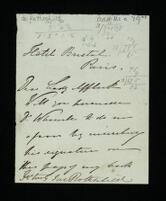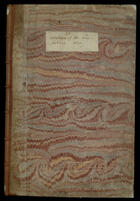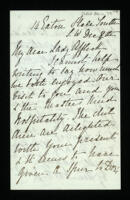Manchester. 100 extraordinary registers printed, Mr Hendy's pamphlet, confident of becoming MP for Oldham, happy to see him in better health
(Atholl Hydropathic, Pitlochry?)—After climbing Ben y Vrackie he and his companions had tea at Moulin. He found her parcel waiting for him at the hydro.
(Letter-head of 87 Clements Inn, W.C., but evidently written in Scotland.)
Is sorry that Mrs Pandit was unable to attend the garden party at Wimbledon. In the circumstances he will discuss his intended visit to India with someone else. Asks whether it would be best to speak to the Minister or someone else at India House.
Lord Pethick-Lawrence will not be able to speak at the meeting on 18 April (see 1/101).
(Text as 1/103a.)
‘The Labour Record and Review’, 19 St Bride Street, London, E.C.—Was sorry to leave her this morning with so many worries. Has spoken with Roscoe, the lawyer, and is about to see Joseph Edwards of the Reformer’s Year Book. Draws her attention to an article in the Independent Review.
Reviews the changes that have taken place since he attended the Indian National Congress at Gauhati in 1926, and reflects on the current problems facing India.
(Carbon copy of a typed original. The article was written for a Souvenir published in connection with the 63rd Indian National Congress. See 2/102–3.)
—————
Transcript
THE CHANGING EAST.
By Rt Hon Lord Pethick-Lawrence
In 1926 I attended the meeting of the Indian National Congress in Gauhati. I am most interested therefore to learn that it is being held there again this year.
What changes have taken place in the 31 intervening years! Then, Congress was still fighting an uphill battle for independence. Now, India ranks among the great nations of the world. Then the self-governing members of the Commonwealth consisted solely of peoples of European extraction. Now it includes peoples of Asia and Africa.
When I was a boy, India used to be spoken of as part of the “Unchanging East”. No one says that today. Everyone can see that India is changing very fast.
One of the reasons why I have come to India now in my 86th year is to try to find out how India is responding to the claims of the new age. During the few weeks that I have been here I have kept my eyes and ears open and I have learnt a great deal about your problems. I realise how great they are in number and intensity. Here are just a few of them:— Education, language, caste and custom, races, power, employment, population, finance, riches and poverty, social welfare, democratic institutions, international relationships.
I have stayed long enough to realise what a colossal task you have to tackle. But it has been much too short for me to come to any well-balanced conclusion as to the degree of your success. Indeed I doubt whether anyone even with far better knowledge than I is yet in a position to measure your all-round progress. In my view another ten or fifteen years will have to elapse before this can be done.
What I can tell you is that your efforts are being watched with the deepest and most friendly interest by the people of my country and by other members of the Commonwealth.
We want so much that you should succeed magnificently. We want so much that your people should increase their standard of life and their stature. We want to see India playing a noble part in the world.
May this Congress at Gauhati bring nearer these high ends!
Playford near Ipswich -- GA and Richarda Airy will not be able to make a trip to Cambridge. GA gives his views regarding 'the objects of university studies and the modes of attaining these objects'. The purpose of a university course is 'to prescribe a course of studies (not necessarily the same for every individual), to assist them by books, lectures, &c, and to stimulate and reward them by honours and pecuniary grants'. It is the responsibility of the college to deal with the first of these requirements. The intention of the college in regard to the college course of studies ought to be built into 'the ordinary subjects prescribed for daily study in the successive years of an undergraduate's college life, and in the examinations relating to them: 'these must practically express the course prescribed by the college'. GA did not approve of the Trinity Commemoration Day prizes: 'The essayists and the youths who have written Alcaics and Elegiacs are called up early, and are addressed in flattering terms, and altogether are made the heroes of the day and of the year, while the first-class-men are dismissed at the end of the ceremony without a single word. The general impression left on me was, that the lectures and the annual examinations are kept up merely for form's sake'. This has injured the educational interests of the college. The changes made since GA was a freshman have given undergraduates too great a share in the selection of their courses of study.
House of Lords.—Invites his correspondent to the annual dinner of Labour Peers.
The fourth notebook of four into which Ramanujan's Notebook 2 was copied by an unidentified person, catalogued as Add.Ms.b.101-104. Chapter XXI is continued from Add.Ms.b.103. Contents: ff 1-5 Chapter XXI (cont'd); ff 6-12 Calculations 'Copied from the Loose Papers': miscellaneous (ff 6-12), proof for Bertrand's Postulate (ff 13-16), reciprocal functions (ff 16-25), approximate summations of series involving prime numbers (ff 25-44), 'Middle of a paper?' on moduli (ff 45-55), 'The Three Quarterly Reports f the late S. Ramanujan, to the Board of Studies in Mathematics, when he was a Research Scholarship-holder', 5 August and 7 November 1913 and 9 March 1914 (ff 64-118).
Sin título11 Old Square, Lincoln’s Inn, W.C.2.—Sends best wishes for her recovery. Will visit her soon.
Stanstead Hall, Halstead, Essex.—Thanks him for his letter of sympathy (on the death of his wife).
(Place of writing not indicated.)—Has received his letter. Refers to their ‘sweet time’ together last night.
(Dated Tuesday.)
Edinburgh. Lectured last night to about a thousand, state of the labourers in Scotland
P.O. Box 1896, Addis Ababa.—Thanks him for his kind words on the death of his mother. They are trying to complete some of her projects, and a memorial issue of the Observer is being prepared.
Collingwood - JH does not like book two of Homer's 'Iliad': 'The catalogue of ships is simply abominable - the whole book is such a falling off from book 1 that (but for other characteristic marks) I should scarcely believe is written by the same author'. JH does not want to see any other translations in advance of his own and 'of those I have seen I like my own best'.
Gives an account of his recent visit to India and Pakistan.
Bolt ourt. Instructs him to pay Mr Dean the balance on his account
Commissioner’s House, Agra.—Discusses the ratios between the earnings of high and low income groups in India. Preparations are being made for Macmillan’s visit.
Flamsteed House, Greenwich - GA has looked at the letter to the Vice-Chancellor and entirely approves of it: 'The unlimited tenure of Fellowships I think to be most important. There is only one thing which at present is doubtful to me, and that is the continuation of Sizarship gratuities after the election as scholars, middle of page 2. I think that the foundation of the independence of the future Fellows is to be found in the position of the scholars, at that proud table (the only one in Hall) where all are equal and no stranger is ever seen. I would carefully abstain from sowing the seed of division there'. GA thanks WW for his Plurality [Of the Plurality of Worlds: An Essay, 3rd edn., 1854]: 'I think it is right. Specially I agree with the leading idea that we have no right to assume or presume that all matter was necessarily meant to be inhabited or as we say useful, but that we must take things as we find them: and I am glad that you have had the boldness to say so'.
(Place of writing not indicated.)—Praises his work at The Echo* and refers to various items in the press. Has finished the Board Schools today, and is just off to see Miss Montagu.
(Dated Tuesday.)
—————
Transcript
Tuesday afternoon.
Thank you for your letters dearest[—]am interested in your measures at the Echo—& am quite sure that you have done the right thing—have infinite confidence in the Jew-man Freddy.
Did you see Ouïda’s letter about Olive Schreiner in the D.N this morning? {1}—Is that the truth do you know?—Did you read what the coster said yesterday in the police court—when asked if he had anything to say in answer to the policeman’s evidence (charge of obstructing traffic) “Taint no use, not a bit—He uses the truth so careless.” Rather sweet nicht wahr? & very applicable to affairs in general in these days. The Education question seems to have got a few days reprieve.
Have done the Board Schools today—& am just off to see Miss Montague who has telegraphed for an interview.
It wants Its Freddy a bit—got a headache principally in the backbone: would like the feel of Its Freddy’s big broad shoulder to night—but will take it “by faith”[.] Meantime loves Its Freddy more than a Bit.. This It
—————
{1} On 16 July 1901 a long letter by the novelist Ouida appeared in the Daily News protesting against Olive Schreiner’s treatment by the British in South Africa.
East Braynes, Wiveliscombe, Somerset.—Asks whether any steps are being taken to revise the pensions of persons formerly employed in India, like himself.
Expresses his belief in the immortality of his soul.
(Carbon copy, marked at the head ‘Given to Esther E Knowles by E.P.L in January 1930.’)










![Copy of Srinivasa Ramanujan's notebook 2: chapters XXI [continued] and miscellaneous papers](/uploads/r/trinity-college-library/1/7/0/1707a83217dfdad7cd14ab2f587825a19b16d9801b0bac4222c50260091fefd6/Add.Ms.b.104_thumb.jpg)











![Letter from William Cobbett to [John Yonge Akerman]](/uploads/r/trinity-college-library/0/7/d/07de75f1b252df66f26a606e193c7fa657fe5090342ba9f20229969bc874f83c/240.SRMS.B24.105.front.tmb.jpg)






